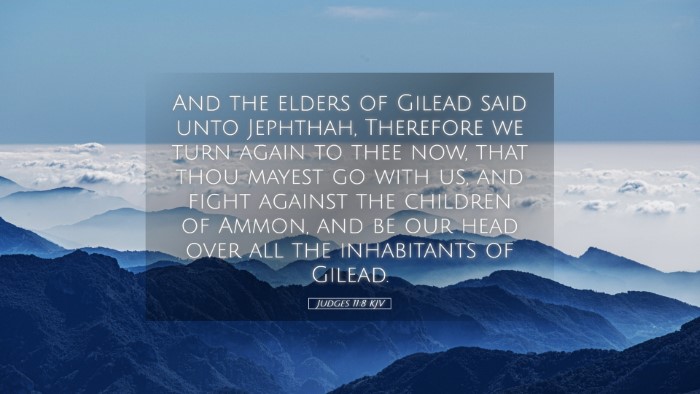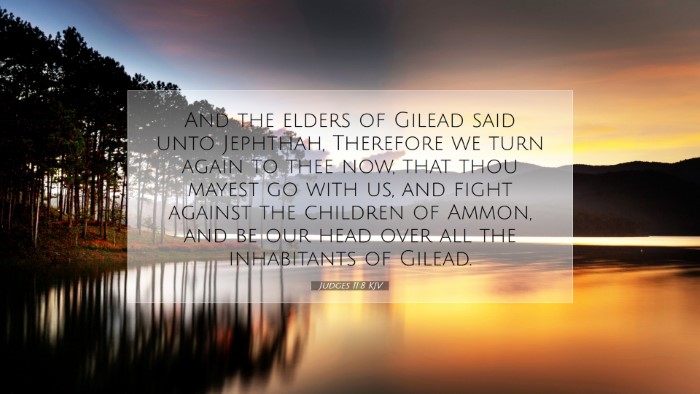Commentary on Judges 11:8
Judges 11:8 states: "And the elders of Gilead said to Jephthah, ‘That is why we have turned to you now, that you may go with us and fight the Ammonites and be our head over all the inhabitants of Gilead.’"
Contextual Background
This verse occurs in a pivotal moment in the narrative of the Book of Judges, set against the backdrop of Israel's cyclical pattern of rebellion, oppression, and deliverance. The inhabitants of Gilead, facing oppression from the Ammonites, seek a warrior leader to deliver them from their plight. Jephthah, a figure marked by both noble qualities and a troubled past, rises as their chosen leader.
Insights from Commentaries
Matthew Henry's Commentary
Matthew Henry emphasizes the significance of Jephthah's background, noting that he was the son of a harlot, which rendered him an outcast in his own community. However, his disenfranchisement becomes integral to his calling as a leader. Henry underscores that God often chooses unlikely vessels to accomplish His purposes. The desperation of the Gileadites led them to cast aside their prejudices, recognizing Jephthah's potential as a military leader despite his social standing.
Albert Barnes' Notes
Albert Barnes provides further insights regarding the political dimension of this appeal. The Gilead elders' request indicates a significant shift; they are willing to offer leadership to one whom they previously marginalized. Barnes points out that their appeal was not merely for military aid but for Jephthah to become their head, implying a recognition that genuine leadership requires both military skill and civic authority. This shows a return to communal coherence, as the tribal society seeks to unify under the would-be leader they previously rejected.
Adam Clarke's Commentary
Adam Clarke offers a detailed textual analysis, highlighting that the elders specifically mention their need for a leader 'to fight the Ammonites.' He notes the dual role that Jephthah will have to fulfill, not only as a commander in battle but also as a head of state. Clarke also remarks on the psychological and spiritual implications of such leadership—Jephthah's understanding of God’s favor and the underlying covenantal relationship with Israel plays a crucial role as the narrative unfolds.
Theological Implications
These commentaries converge on significant theological themes within Judges 11:8:
- Divine Sovereignty: The selection of Jephthah as leader highlights God's ability to choose and empower individuals from all walks of life. This divinely appointed leadership underscores the belief that God equips those He calls, regardless of their past failures or societal status.
- Community and Reconciliation: The elders' decision to turn to Jephthah reflects the necessity of reconciliation within communities. In times of crisis, the importance of unity, forgiveness, and the acknowledgment of gifts in others transcends previous grievances.
- Leadership Dynamics: Jephthah's acceptance of leadership illustrates the complex relationship between authority and legitimacy. Effective leaders are those who respond to the calls of their community, even amidst personal struggle.
Applications for Pastors and Theologians
This passage provides rich material for pastoral reflection and theological discourse:
- Empowering the Marginalized: Pastors can draw inspiration from Jephthah's story, advocating for inclusive leadership that embraces those who have been marginalized or overlooked in society. It is essential to recognize the potential for God's work through all individuals.
- Reconciliation in Ministry: Leaders are called to foster environments of reconciliation, addressing past conflicts and embracing unity for the greater mission of the church. This allows congregations to grow healthier together.
- Understanding Leadership in Crisis: The process through which Jephthah became a leader during Israel’s crisis can serve as a guide for churches facing their own challenges. It sheds light on how to discern God’s chosen leaders and support them in fulfilling their God-given call.
Conclusion
Judges 11:8 encapsulates a transformative moment for both Jephthah and the Gileadites. Through the insights provided by various commentaries, we see a complex interplay of social status, godly vocation, and the profound need for leadership in times of adversity. As communities today face their challenges, the lessons from Jephthah’s story remain profoundly relevant—illustrating that within God’s plan, every individual can rise to fulfill their purpose and lead others in faith.


